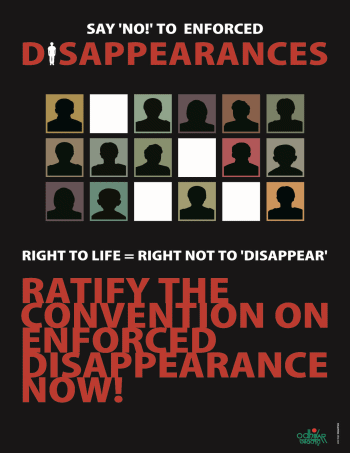 Today, 30 August, marks the International Day of the Victims of Enforced Disappearances. On 20 December 2006, the United Nations General Assembly adopted the International Convention for the Protection of All Persons from Enforced Disappearance.
Today, 30 August, marks the International Day of the Victims of Enforced Disappearances. On 20 December 2006, the United Nations General Assembly adopted the International Convention for the Protection of All Persons from Enforced Disappearance.
After the fall of the authoritarian regime of Sheikh Hasina, the interim government acceded to the Convention on 29 August 2024. It is now in the process of reviewing a draft law criminalizing enforced disappearance.
The authoritarian government led by Sheikh Hasina from 2009 – 05 August 2024, used enforced disappearance as a tool of state repression. Secret detention facilities were created across the country to unlawfully detain people. Opposition political leaders and activists, dissenters, and so-called “militants” were kept in these facilities. Among the most notorious were the DGFI’s Joint Interrogation Centre and RAB’s secret detention facilities. These were mainly used to disappear and torture political opponents of the Awami League, as well as those who raised their voices against Sheikh Hasina and protested the Indian government’s interference in Bangladesh. Many victims of enforced disappearance are still missing. Those who resurfaced were often implicated in fabricated cases; some were even sentenced to death and are being held in condemned cells. Victims of enforced disappearance were subjected to severe physical and psychological torture, and many were extrajudicially killed after being disappeared.
Following the fall of the authoritarian regime on 5 August 2024, through a student–people’s uprising, the families of the disappeared began filing complaints with the Commission of Inquiry on Enforced Disappearances. This revealed to the public the true extent of the crime. A report by the Commission noted that enforced disappearances were carried out through a “three-tier pyramid,” at the top of which was the “strategic leadership” — including former Prime Minister Sheikh Hasina, then Defence Adviser Tarique Ahmed Siddique, the former Home Minister, and other senior officials of the Awami League government. Additionally, there was a secret and unlawful prisoner exchange programme between the intelligence agencies of Bangladesh and India, under which victims of enforced disappearance were taken to India and held there.
Although enforced disappearances have not occurred under the current interim government, Odhikar warns that if the spirit of the July Uprising is not upheld and a democratic state is not established, such crimes against humanity will continue in the future. Therefore, Odhikar calls upon the people of Bangladesh, regardless of political affiliation, to unite in order to implement the ongoing reform initiatives spearheaded by the interim government and the Commissions formed by it.
The Asian Federation Against Involuntary Disappearances, Fortify Rights and Odhikar demand that the interim government:
- Disclose to the public the fate of all victims of enforced disappearance who have not yet returned.
- Ensure that the wives and children of those who are still missing are able to manage the disappeared person’s bank accounts and use, transfer, or sell their movable and immovable property.
- Since some of the disappeared were taken to India and later recovered, initiate diplomatic communication with the Government of India to determine whether more victims are being held there.
- Withdraw all fabricated cases against those who have reappeared after being disappeared, and release those imprisoned on the basis of false testimony or confessions extracted through torture, including those sentenced to death by lower courts.
- Bring all perpetrators of enforced disappearances under the law and prosecute them in the International Criminal Court.
- Enact a specific law addressing enforced disappearances without delay.




